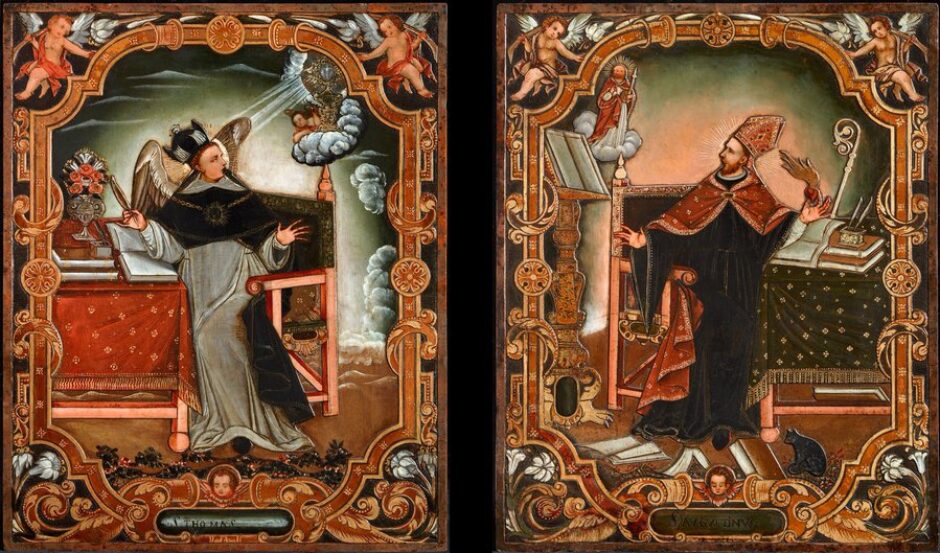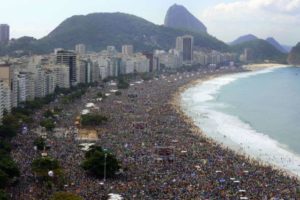QUAERITUR:
What is physically required for the laity to participate at Mass? If the laity cannot enter the church building, is outdoor Mass required for the laity to be able to participate? If one can follow the liturgy taking place inside the Church (hearing bells, following along over a PA or digital stream), does being outside of the Church suffice? Does live streaming suffice for participating in Mass?
For the sake of this question, I want to lay aside the question of exceptional “mega Masses” as when some Pope or other shows up and people are so far away – including both concelebrants and even ciboria to be consecrated – that, well, who knows what’s happening. Those Masses will be terminated when We have ascended to the Throne of Peter.
Let’s make a distinction. There is participation and there is obligatory participation. Under normal circumstances we are obliged to participate at Holy Mass on Sundays and some other days. Otherwise, we are free to participate or not. During this COVID-1984 thing that’s going on, most bishops (all?) have dispensed people in their dioceses from the obligation to participate on those days when they would otherwise be bound. It is withing their power to do that. It is, in fact, beyond their power to forbid Communion on the tongue, but they are getting away with it. But they can lift the obligation to attend Sundays Masses.
Let’s make another distinction. There is actual, physical presence and there is moral presence. If you are in the church building, and in sight of the physical altar, you are present. If you are near the church building, but because of the crowds (say, for a huge funeral – a normal huge funeral, not necessarily a gargantuan funeral like that of St. John Paul II), or you are in an overflow area and have screens to watch of the video feed of what is going on, or if you have taken precious little Stupor Mundi outside during her sixth melt-down during Mass, you are not physically present but you are morally present. You are there, you would be inside if you could be, you are engaging the best you can in your situation. Contrast that with someone who decides that it is better to go outside and have a cigarette and maybe surf on his smart phone for a while. And contrast that with a surgeon who is on-call, who get’s an call that he has to take, so he goes outside.
So, given the circumstances, what really matters is the person’s intention and effort.
































Good article. Like the distinction between physical and moral presence. Never thought about that before! Well said.
And temporally? Can we still say “from the Offertory to the priest’s Communion” satisfies the obligation? This does bring out that the “the Eucharist is above all else a sacrifice” (Pope Saint John Paul II), that yes (Oh! The vapours!) that the “liturgy of the word” is less important, even if it is really, really important.
The Sacrifice part is the action of a Divine Person, it is a theandric action, an intervention of the God-man, whereas, not without the action of the Holy Spirit, the Liturgy of the Word, or Mass of the Catechumens, is an action of the Church herself, composed of actions of finite, mortal human persons (not lacking in the activity of angelic persons).
Thank you, Fr. Z. Very clear and practical.
To Fr. PJM: Is it possible that the EF and the OF differ in respect of what portion of Mass satisfies for their having been “at Mass”? I have, most of my life, heard that it is from the Gospel to the priest’s communion, for the OF. The theory offered (so far as I have heard any theory) is that the OF Mass “consists of two parts”, i.e. the “liturgy of the Word” and the “liturgy of the Eucharist” . In the first, we speak to God (prayers of penitence, adoration, supplication) and God speaks to us in the readings, especially in the Gospel. In the second, the priest offers the sacrifice to God, and God offers the Son to us. I don’t know if that theory has official standing, but it does make some sort of sense.
I think theologians disagree on how much of the Mass one has to attend to fulfill the obligation. My parents used religion texts that were printed before 1958 for us and I am fairly certain that we learned that one had to hear the Gospel to fulfill the obligation and that the Offertory through the priest’s Communion had to be at the same Mass. I guess if you got to church before the Offertory, you were supposed to stay through the Mass of the Faithful at the next Mass.
Dear Alice,
I think theologians disagree on how much of the Mass one has to attend to fulfill the obligation. They don’t, strictly speaking. The obligation, as such, is from beginning of one Mass to the end of the same Mass. This wouldn’t include Vidi aquam, the concluding song, or the weather-blessing, and I’m not so sure about vernacular repetition of lectures & sermon (speaking in VO jargon), but as for the rest: obviously so.
The question to whose answers you alude to is slightly different, namely, how much of the obligation must be fulfilled so that the neglect to fulfill it fully is, even absent any excuse, no more than a venial sin. St. Alphonsus, with reluctance, says “Offertory through Communion [of the priest]”; “I personally cannot see how the the Gospel would not obligate as much, but seeing that so many prudent authors like NN. NN. NN. state missing it is venial, a Catholic cannot be reproached for following them” (no literal quote).
A look at the Ordinary of the Mass shows that there is no “exit antiphon” to which would correspond a replacing hymn or song. So when the priest or deacon says “go in peace”, we may go.
I was brought up, however, not to leave until the priest had returned to the sacristy.